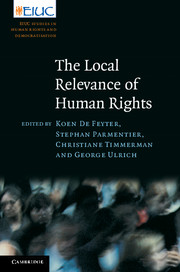Book contents
- Frontmatter
- Contents
- Contributors
- Series editors' preface
- Preface
- Abbreviations
- 1 Introduction: reconsidering human rights from below
- 2 Sites of rights resistance
- 3 Freedom from want revisited from a local perspective: evolution and challenges ahead
- 4 Relevance of human rights in the glocal space of politics: how to enlarge democratic practice beyond state boundaries and build up a peaceful world order
- 5 The local relevance of human rights: a methodological approach
- 6 Ensuring compliance with decisions by international and regional human rights bodies: the case of the European Committee for the Prevention of Torture
- 7 Building rights-based health movements: lessons from the Peruvian experience
- 8 Defining human rights when economic interests are high: the case of the western Shoshone
- 9 Struggling to localise human rights: the experience of indigenous peoples in Chile
- 10 Enforcing environmental rights under Nigeria's 1999 Constitution: the localisation of human rights in the Niger Delta region
- 11 Conflict resolution through cultural rights and cultural wrongs: the Kosovo example
- 12 Epilogue: widening the perspective on the local relevance of human rights
- Index
1 - Introduction: reconsidering human rights from below
Published online by Cambridge University Press: 07 October 2011
- Frontmatter
- Contents
- Contributors
- Series editors' preface
- Preface
- Abbreviations
- 1 Introduction: reconsidering human rights from below
- 2 Sites of rights resistance
- 3 Freedom from want revisited from a local perspective: evolution and challenges ahead
- 4 Relevance of human rights in the glocal space of politics: how to enlarge democratic practice beyond state boundaries and build up a peaceful world order
- 5 The local relevance of human rights: a methodological approach
- 6 Ensuring compliance with decisions by international and regional human rights bodies: the case of the European Committee for the Prevention of Torture
- 7 Building rights-based health movements: lessons from the Peruvian experience
- 8 Defining human rights when economic interests are high: the case of the western Shoshone
- 9 Struggling to localise human rights: the experience of indigenous peoples in Chile
- 10 Enforcing environmental rights under Nigeria's 1999 Constitution: the localisation of human rights in the Niger Delta region
- 11 Conflict resolution through cultural rights and cultural wrongs: the Kosovo example
- 12 Epilogue: widening the perspective on the local relevance of human rights
- Index
Summary
The last half century has witnessed huge efforts to establish the universality of human rights. Since the adoption of the Universal Declaration of Human Rights (UDHR) on 10 December 1948, numerous international treaties and declarations have reaffirmed human rights as norms applicable on a global scale. Several universal and regional institutions of an expert or governmental nature are now monitoring compliance with human rights norms.
It is, however, unclear whether the global regime that was so painstakingly developed over the last few decades is of much practical use at the local level to people confronted with the abuse of power and/or inhumane living conditions. This question is particularly important in the current era of globalisation, when economic and political institutions of different kinds shape and reshape the world at a rapid pace.
- Type
- Chapter
- Information
- The Local Relevance of Human Rights , pp. 1 - 10Publisher: Cambridge University PressPrint publication year: 2011
- 2
- Cited by

